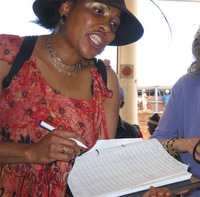|
Rant. Muse. Eat. Sleep. Recycle. |
|

Previous Posts
Fellow Bloggers
Links |
Wednesday, August 30, 2006 Judge says, 'Yeah. So what's your point?'  A Federal Judge in Michigan ruled yesterday that an anti Affirmative Action proposal can be put on the November ballot even though the judge acknowledged that the signatures on the petition to get the measure on the ballot were obtained through wide spread fraud. A Federal Judge in Michigan ruled yesterday that an anti Affirmative Action proposal can be put on the November ballot even though the judge acknowledged that the signatures on the petition to get the measure on the ballot were obtained through wide spread fraud.Wha? The petition – sent out by the “Michigan Civil Rights Initiative” -- never even mentioned the words “affirmative action.” In fact, the petition appeared to be pro civil rights. I mean, just look at the name of the sponsoring group: the "Michigan Civil Rights Initiative." These signatures, gained fraudulently, will go to support a measure that, essentially, bans Affirmative Action in Michigan. That would be like getting Jae to sign a petition for a measure that would ban the alternative press. Can you say Bannana? + + + DETROIT (AP) — "A federal judge on Tuesday allowed an anti-affirmative-action proposal to go before Michigan voters despite agreeing with opponents that it won a place on the November ballot through widespread fraud. U.S. District Judge Arthur Tarnow, in a 34-page ruling, said opponents proved the Michigan Civil Rights Initiative "committed voter fraud in obtaining signatures in support of the petition." But they did not prove the MCRI violated the federal Voting Rights Act by depriving minorities of equal access to the political process, he said. Opponents argued that the MCRI sought to defraud black voters in particular. "However, the MCRI appears to have targeted all Michigan voters for deception without regard to race," Tarnow wrote. If approved by voters, the MCRI's proposal would amend the state constitution to ban race and gender preferences in government hiring and public-university admissions in Michigan. Lawyers representing the MCRI and state elections officials told Tarnow last month that Michigan residents would be harmed if they were not allowed to vote on the issue. Opponents said the MCRI misrepresented the referendum's ultimate aims while petitioning to put the issue on the ballot. Witnesses testified before Tarnow that they were tricked into signing or collecting signatures on petitions circulated by the MCRI. Tarnow sharply rebuked state officials whose "indifference to valid allegations of voter fraud" allowed the MCRI proposal to make its way to the ballot — allegations investigated only by the relatively powerless state Civil Rights Commission. "With the exception of the Michigan Civil Rights Commission, the record shows that the state has demonstrated an almost complete institutional indifference to the credible allegations of voter fraud raised by Plaintiffs ... However, the Court cannot turn back the clock, and can only deal with the facts that are presented to it," Tarnow wrote. The judge said in his ruling that "voters who were induced by fraud into signing the petition still have an opportunity to participate in the political process by voting against the proposal in the general election." Jennifer Gratz, executive director of the MCRI, praised Tarnow's ruling but criticized his conclusion that fraud was committed. "We are happy that he's ruled that the people are allowed to decide this issue," said Gratz, of Lansing. "However, the rest of his commentary is judicial activism at its worst." Opponents, including an affiliate of the pro-affirmative-action group By Any Means Necessary, said Tuesday that they would ask the 6th U.S. Circuit Court of Appeals to keep the MCRI proposal off the ballot. "Everything we've been saying for the last year and a half, we have the (Michigan) Civil Rights Commission, and now a federal judge, saying it's true," BAMN attorney George Washington said. "There are people who are against affirmative action who should be outraged at what's being done in their name. This should not be a con game." The federal lawsuit was based in part on a report from the Civil Rights Commission, which said MCRI misrepresented its purpose to get voters to sign its petitions. State courts ruled earlier that the MCRI proposal should be allowed on the ballot. The MCRI submitted more than 508,000 voter signatures in support of its ballot drive, far more than the 317,517 required by state law. The ballot wording approved by state elections director Chris Thomas refers twice to a ban on "affirmative action," a phrase that does not appear on the MCRI petition. The MCRI was formed after the U.S. Supreme Court in June 2003 upheld a general affirmative action admissions policy at the University of Michigan Law School. The high court also struck down the university's undergraduate formula as too rigid because it awarded admission points based on race. Gratz was one of two plaintiffs in the undergraduate admissions lawsuit. "The citizens of Michigan now will be able to vote this November on whether to amend the state constitution to prohibit state agencies from granting preferences to individuals based upon race," said Terry Pell, president of the Center for Individual Rights, which represented Gratz in the undergraduate lawsuit. A spokesman for One United Michigan said the bipartisan coalition of business, labor, religious and civic groups would continue fighting to defeat the MCRI proposal in November, regardless of the court battle. "Their goal is to mislead Michigan about the true nature of this campaign, which would roll back progress for women as well as minorities," David Waymire said." Posted by Kay 1 Comments:
Want to Post a Comment? |



